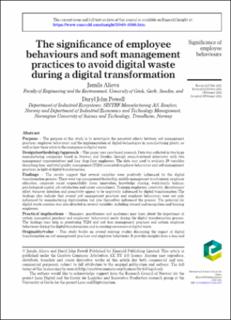| dc.contributor.author | Alieva, Jamila | |
| dc.contributor.author | Powell, Daryl | |
| dc.date.accessioned | 2023-01-26T16:48:46Z | |
| dc.date.available | 2023-01-26T16:48:46Z | |
| dc.date.created | 2022-04-27T13:50:28Z | |
| dc.date.issued | 2022 | |
| dc.identifier.citation | International Journal of Lean Six Sigma. 2022, 1-32. | en_US |
| dc.identifier.issn | 2040-4166 | |
| dc.identifier.uri | https://hdl.handle.net/11250/3046693 | |
| dc.description.abstract | Purpose:
The purpose of this study is to investigate the perceived effects between soft management practices, employee behaviours and the implementation of digital technologies in manufacturing plants, as well as how these relate to the emergence of digital waste.
Design/methodology/approach:
This paper uses case-based research. Data was collected in two large manufacturing companies based in Norway and Sweden through semi-structured interviews with two management representatives and four shop-floor employees. The data was used to evaluate 29 variables describing lean- and total quality management (TQM)-associated employee behaviours and soft management practices, in light of digital transformation.
Findings:
The results suggest that several variables were positively influenced by the digital transformation process. These were top management leadership, middle management involvement, employee education, corporate social responsibility focus, innovation, knowledge sharing, work-family balance, psychological capital, job satisfaction and career commitment. Training employees, creativity, discretionary effort, turnover intention and proactivity appear to be negatively influenced by digital transformation The findings also indicate that several soft management practices and employee behaviours were not only influenced by manufacturing digitalization but also themselves influenced the process. The potential for digital waste creation was also detected in several variables, including reward and recognition and training employees.
Practical implications:
Managers, practitioners and academics may learn about the importance of certain managerial practices and employees’ behavioural needs during the digital transformation process. The findings may help in prioritizing TQM and soft lean management practices and certain employee behaviours during the digital transformation and in creating awareness of digital waste.
Originality/value:
This study builds on several existing studies discussing the impact of digital transformation on soft management practices and employee behaviours. It provides insights from a lean and TQM angle and offers a means of prioritizing certain practices and behaviours during a digital transformation. This study also highlights the significance of digital waste. | en_US |
| dc.language.iso | eng | en_US |
| dc.rights | Navngivelse 4.0 Internasjonal | * |
| dc.rights.uri | http://creativecommons.org/licenses/by/4.0/deed.no | * |
| dc.subject | Non-utilized talent | en_US |
| dc.subject | Digital transformation | en_US |
| dc.subject | Lean management | en_US |
| dc.subject | TQM | en_US |
| dc.subject | Digitalization | en_US |
| dc.subject | Employee behavior | en_US |
| dc.subject | Digital waste | en_US |
| dc.title | The significance of employee behaviours and soft management practices to avoid digital waste during a digital transformation | en_US |
| dc.title.alternative | The significance of employee behaviours and soft management practices to avoid digital waste during a digital transformation | en_US |
| dc.type | Peer reviewed | en_US |
| dc.type | Journal article | en_US |
| dc.description.version | publishedVersion | en_US |
| dc.rights.holder | © Jamila Alieva and Daryl John Powell | en_US |
| dc.source.pagenumber | 1-32 | en_US |
| dc.source.journal | International Journal of Lean Six Sigma | en_US |
| dc.identifier.doi | 10.1108/IJLSS-07-2021-0127 | |
| dc.identifier.cristin | 2019551 | |
| cristin.ispublished | true | |
| cristin.fulltext | original | |
| cristin.qualitycode | 1 | |

